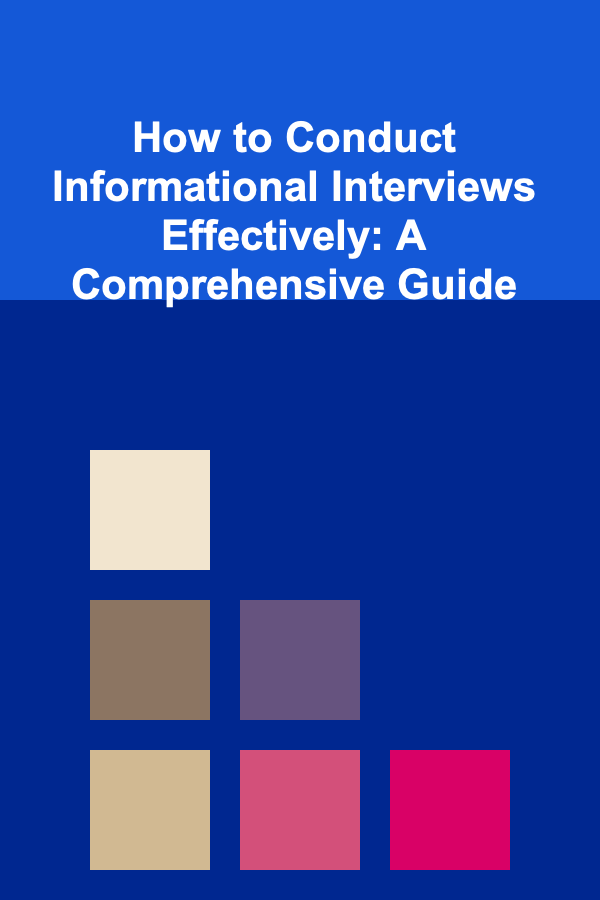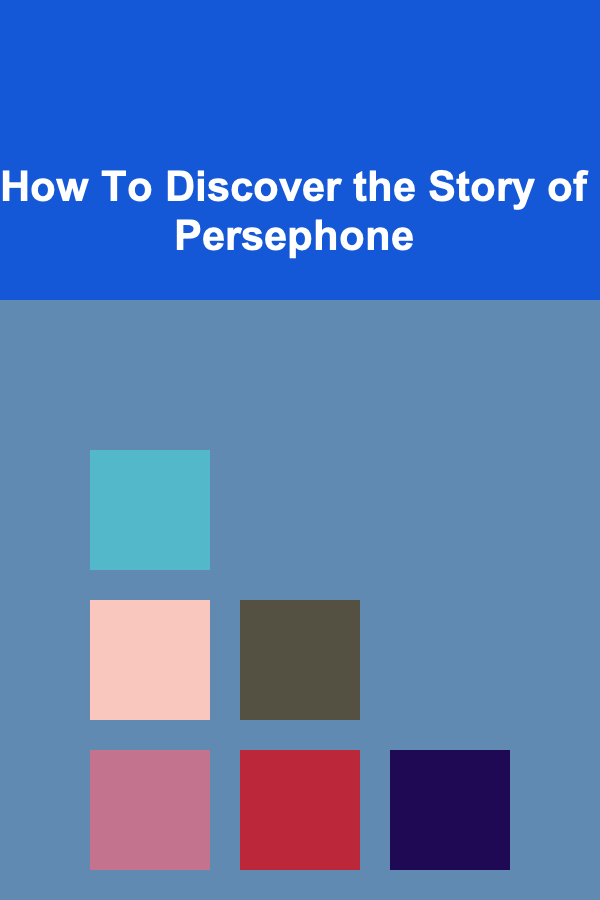
How to Conduct Informational Interviews Effectively: A Comprehensive Guide
ebook include PDF & Audio bundle (Micro Guide)
$12.99$9.99
Limited Time Offer! Order within the next:

Informational interviews are a powerful tool for career exploration and networking. Unlike job interviews, where the focus is on evaluating you for a specific role, informational interviews are about gathering insights and building connections. They offer a unique opportunity to learn about different industries, roles, and company cultures directly from people working within them. Mastering the art of conducting effective informational interviews can significantly enhance your career trajectory, broaden your professional network, and provide invaluable guidance as you navigate your career path. This comprehensive guide will delve into the essential steps and strategies for planning, conducting, and following up on informational interviews to maximize their impact.
I. Defining Your Goals and Identifying Potential Interviewees
Before reaching out to anyone, it's crucial to define your objectives for conducting informational interviews. What do you hope to achieve? What specific information are you seeking? Clarity in your goals will not only help you identify the right people to interview but also guide your questions and ensure you get the most out of each conversation.
A. Setting Clear Objectives
Consider these questions when defining your objectives:
- Industry Exploration: Are you trying to learn more about a specific industry? If so, identify the key sectors within that industry that interest you.
- Role Exploration: Are you curious about a particular job title or function? Understand the responsibilities, required skills, and typical career paths associated with that role.
- Company Culture: Do you want to gain insights into the culture of a specific company? Research the company's mission, values, and work environment.
- Career Path Guidance: Are you seeking advice on how to break into a specific field or advance in your career? Identify experienced professionals who can offer mentorship and guidance.
- Skill Gap Analysis: Are you trying to identify skills you need to acquire to reach your career goals? Target individuals in your desired roles to understand the current skill landscape.
- Networking Opportunities: While not the primary goal, informational interviews can naturally lead to networking opportunities. Consider who might be able to connect you with other relevant individuals.
Write down your specific goals for each interview. This will serve as a roadmap for your preparation and help you stay focused during the conversation. For example, instead of a vague goal like "learn about marketing," a more specific goal might be "understand the day-to-day responsibilities of a digital marketing specialist in the tech industry."
B. Identifying Potential Interviewees
Once you have a clear understanding of your goals, the next step is to identify individuals who can provide valuable insights. Here are several strategies for finding potential interviewees:
- LinkedIn: LinkedIn is an invaluable resource for identifying professionals in specific industries and roles. Use advanced search filters to target individuals based on their job title, company, location, and skills.
- Your Existing Network: Start with your existing network -- friends, family, former colleagues, professors, and alumni. Even if they don't work in your target field, they may know someone who does. Don't underestimate the power of weak ties.
- Company Websites: Browse the "About Us" or "Team" pages of companies that interest you. Identify individuals whose roles align with your career aspirations.
- Professional Associations: Join relevant professional associations and attend their events. This is a great way to meet people in your field of interest and build connections.
- Industry Events and Conferences: Attend industry events and conferences to network with professionals and learn about emerging trends.
- University Alumni Networks: Leverage your university's alumni network to connect with graduates working in your field.
- Referrals: Ask your existing contacts if they know anyone who might be willing to speak with you. A warm introduction can significantly increase your chances of getting an interview.
When identifying potential interviewees, consider their experience level, current role, and industry expertise. Target individuals who are knowledgeable, approachable, and willing to share their insights. Also, look for individuals who are relatively accessible -- those who are active on LinkedIn, attend industry events, or have a history of mentoring others.
C. Researching Potential Interviewees
Before reaching out to an individual, conduct thorough research. This will demonstrate your genuine interest and allow you to tailor your questions to their specific experience and expertise. Here are some key areas to research:
- LinkedIn Profile: Review their LinkedIn profile to understand their career trajectory, skills, education, and affiliations. Pay attention to their accomplishments, responsibilities, and any recommendations they've received.
- Company Website: Learn about their company's mission, values, products, services, and recent news. Understand their role within the organization and how their work contributes to the company's overall success.
- Online Articles and Publications: Search for articles, blog posts, or presentations they've authored or been featured in. This can provide valuable insights into their expertise and perspectives on industry trends.
- Social Media: Check their social media presence (Twitter, Facebook, etc.) to get a sense of their personality and interests. This can help you find common ground and build rapport. However, be mindful of privacy and avoid making assumptions based solely on their social media activity.
- Company News and Announcements: Stay up-to-date on any recent news or announcements related to their company. This will allow you to ask informed questions and demonstrate your interest in their work.
Taking the time to research your interviewees will not only impress them but also help you formulate more insightful and relevant questions.
II. Crafting the Perfect Outreach Message
Your initial outreach message is crucial for securing an informational interview. It should be concise, professional, and personalized. Clearly state your purpose, explain why you're reaching out to them specifically, and make it easy for them to say yes.
A. Subject Line Essentials
The subject line is the first thing your potential interviewee will see. It should be clear, concise, and compelling. Here are some effective subject line examples:
- Informational Interview Request - [Your Name]
- Networking Request - [Your Name] - Interested in [Their Area of Expertise]
- Inquiry from [Your University/Company] - Seeking Career Advice
- Referral from [Mutual Connection] - Informational Interview Request
- Quick Question for [Their Job Title] at [Their Company]
Avoid generic subject lines like "Information Request" or "Networking Opportunity." Be specific and personalize the subject line whenever possible, especially if you have a mutual connection.
B. The Body of Your Message: Key Components
The body of your message should be brief and to the point. Include the following key components:
- Introduction: Introduce yourself and briefly explain your background and interests.
- Purpose: Clearly state that you are requesting an informational interview, not a job interview.
- Why Them? Explain why you're reaching out to them specifically. Mention something you admire about their career, their company, or their expertise. This demonstrates that you've done your research and are genuinely interested in their insights.
- Specific Questions: Briefly mention the types of questions you'd like to ask. This gives them an idea of what to expect and helps them prepare.
- Time Commitment: Be respectful of their time. Suggest a short meeting, such as 20-30 minutes. Offer flexibility in terms of scheduling.
- Gratitude: Thank them in advance for their time and consideration.
- Call to Action: Make it easy for them to respond. Include a clear call to action, such as "Would you be available for a brief call in the next few weeks?"
Here's an example outreach message:
Subject: Informational Interview Request - John Doe
Dear Ms. Smith,
My name is John Doe, and I'm a recent graduate from XYZ University with a degree in Marketing. I'm very interested in learning more about the digital marketing landscape, and I've been following your work at ABC Company for some time. I was particularly impressed with your recent campaign on social media.
I'm reaching out to request a brief informational interview to learn more about your experiences as a Digital Marketing Manager. I'm particularly interested in understanding the day-to-day responsibilities of your role and the skills you find most valuable in this field.
I understand you're busy, and I would only need about 20-30 minutes of your time. I'm flexible and can work around your schedule.
Thank you for your time and consideration. I look forward to hearing from you.
Sincerely,
John Doe
[Your Phone Number]
[Your Email Address]
[Your LinkedIn Profile URL]
C. Personalization is Key
Avoid sending generic, mass-produced messages. Personalize each message to the individual you're contacting. Mention specific achievements, projects, or articles that resonate with you. This demonstrates that you've taken the time to research them and are genuinely interested in their insights.
D. Following Up Politely
If you don't hear back within a week, follow up politely. Resend your original message with a brief note, such as "Just wanted to follow up on my previous email." Avoid being pushy or demanding. Remember that they are doing you a favor by taking the time to speak with you.
III. Preparing Thoughtful and Engaging Questions
The quality of your questions will determine the value you get from the informational interview. Prepare a list of thoughtful and engaging questions that are tailored to the individual's experience and expertise. Avoid asking questions that can be easily answered through online research.
A. Types of Questions to Ask
Here are some categories of questions to consider:
- About Their Career Path:
- How did you get started in this field?
- What were the key decisions or turning points in your career?
- What do you enjoy most about your work?
- What are the biggest challenges you face in your role?
- What skills or qualities do you think are most important for success in this field?
- What advice would you give to someone just starting out in this industry?
- About Their Current Role:
- Can you describe a typical day in your role?
- What are the key responsibilities of your position?
- What projects are you currently working on?
- What technologies or tools do you use in your work?
- How does your role contribute to the company's overall goals?
- About the Industry:
- What are the biggest trends and challenges facing the industry?
- What are the emerging technologies or innovations that are shaping the future of the industry?
- What are the key skills or competencies that will be in demand in the future?
- What resources (books, websites, conferences) would you recommend for staying up-to-date on industry trends?
- About the Company Culture:
- Can you describe the company culture?
- What are the values that are most important to the company?
- What opportunities are there for professional development and growth within the company?
- How does the company support work-life balance?
- Career Advice:
- What skills should I focus on developing to break into this field?
- What are some common mistakes that people make when trying to enter this industry?
- What resources or training programs would you recommend?
- Do you have any advice for networking and building connections in this field?
- Networking Opportunities:
- Do you know of anyone else who might be willing to speak with me about this field?
- Would you be willing to connect me with someone in your network?
B. Crafting Open-Ended Questions
Focus on asking open-ended questions that encourage the interviewee to share their insights and experiences. Avoid asking questions that can be answered with a simple "yes" or "no." For example, instead of asking "Do you like your job?", ask "What do you enjoy most about your work?"
C. Tailoring Questions to the Interviewee
Customize your questions to the individual you're interviewing. Refer to their LinkedIn profile, company website, or articles they've written to craft questions that are relevant to their specific experience and expertise. This demonstrates that you've done your research and are genuinely interested in their insights.
D. Avoiding Certain Questions
Avoid asking questions that are inappropriate or unethical, such as questions about their salary, personal life, or political views. Also, avoid asking questions that are easily answered through online research. The purpose of the informational interview is to gain insights that you can't find elsewhere.
E. Preparing Follow-Up Questions
Be prepared to ask follow-up questions based on the interviewee's responses. This shows that you're actively listening and engaged in the conversation. Don't be afraid to deviate from your prepared list of questions if the conversation takes an interesting turn.
IV. Mastering the Interview: Execution and Etiquette
The success of an informational interview hinges not only on preparation but also on your execution and adherence to proper etiquette during the conversation.
A. Punctuality and Professionalism
Always be on time for your scheduled interview, whether it's in person or virtual. If you're running late, notify the interviewee as soon as possible. Dress professionally, even for virtual meetings. Maintain a positive and respectful attitude throughout the conversation.
B. Building Rapport
Start the interview by building rapport. Thank the interviewee for their time and express your appreciation for their willingness to speak with you. Find common ground and engage in some light conversation before diving into your questions. Show genuine interest in their career and experiences.
C. Active Listening and Engagement
Pay close attention to what the interviewee is saying. Listen actively and ask clarifying questions to ensure you understand their perspective. Make eye contact, nod your head, and use verbal cues (e.g., "That's interesting," "I understand") to show that you're engaged in the conversation. Take notes, but not excessively. Balance note-taking with maintaining eye contact and active listening.
D. Time Management
Be mindful of the time. Stick to the agreed-upon time limit. At the end of the interview, thank the interviewee again for their time and insights. Ask if there's anything you can do to help them in return.
E. Asking for Referrals (Strategically)
If appropriate, ask for referrals to other professionals in their network. However, be strategic about this. Only ask for referrals if you've established a good rapport and genuinely believe that the interviewee can help you connect with relevant individuals. Be specific about the types of people you're looking to connect with. A good way to phrase this is: "Based on what I've told you about my interests, do you know of anyone else who you think I should speak with?"
F. Non-Verbal Communication
Be aware of your non-verbal communication. Maintain good posture, make eye contact, and use positive body language. Avoid fidgeting, checking your phone, or appearing distracted. Project confidence and enthusiasm.
V. Following Up and Maintaining the Connection
The final step in conducting effective informational interviews is to follow up promptly and maintain the connection. This is crucial for building lasting relationships and maximizing the long-term benefits of the interview.
A. Sending a Thank-You Note
Send a personalized thank-you note within 24 hours of the interview. Express your gratitude for the interviewee's time and insights. Mention something specific that you learned or found particularly helpful. Reinforce your interest in their field and reiterate your commitment to pursuing your career goals.
Here's an example thank-you note:
Dear Ms. Smith,
Thank you so much for taking the time to speak with me yesterday. I truly appreciate your insights into the role of a Digital Marketing Manager at ABC Company. I especially found your advice on developing my skills in SEO and content marketing to be incredibly helpful.
Our conversation has further solidified my interest in pursuing a career in digital marketing. I'm now even more motivated to continue learning and developing my skills in this field.
Thank you again for your time and guidance. I hope to stay in touch.
Sincerely,
John Doe
B. Staying in Touch
Don't let the connection fade after the thank-you note. Stay in touch with the interviewee periodically. Share relevant articles or news that you think they might find interesting. Connect with them on LinkedIn. Attend industry events or conferences together. Offer to help them in any way you can. Maintaining the connection can lead to future opportunities, such as mentorship, referrals, or even job offers.
C. Implementing the Advice Received
Demonstrate that you've taken their advice to heart by implementing their suggestions. If they recommended a book, read it. If they suggested a course, enroll in it. If they offered a referral, follow up on it. Let them know the positive impact their advice has had on your career journey. This shows that you value their insights and are committed to your professional development.
D. The Long-Term View
Think of informational interviews as an investment in your long-term career success. Building relationships takes time and effort, but the rewards can be significant. By consistently nurturing your network and staying connected with the people you meet, you can create a strong foundation for your future career.
VI. Common Pitfalls and How to Avoid Them
While informational interviews are a valuable tool, there are several common pitfalls that can hinder their effectiveness. Being aware of these pitfalls and proactively avoiding them will significantly enhance your chances of success.
A. Treating it Like a Job Interview
One of the biggest mistakes is treating an informational interview like a job interview. The purpose is to gather information and build connections, not to ask for a job. Avoid directly asking for a job or internship during the interview. Instead, focus on learning from their experiences and building a relationship.
Solution: Frame your questions and conversation around learning about their career path, industry insights, and advice. Focus on building rapport and establishing a genuine connection.
B. Being Unprepared
Failing to research the interviewee and prepare thoughtful questions is a major pitfall. It demonstrates a lack of respect for their time and shows that you're not genuinely interested in their insights.
Solution: Conduct thorough research on the interviewee and their company. Prepare a list of tailored, open-ended questions that demonstrate your interest and knowledge.
C. Asking Generic Questions
Asking generic questions that can be easily answered through online research wastes the interviewee's time and shows a lack of effort. It also indicates that you haven't done your homework.
Solution: Craft specific and insightful questions that delve deeper into their experiences, perspectives, and expertise. Avoid asking questions that can be easily found on their LinkedIn profile or company website.
D. Being Unclear About Your Goals
If you're not clear about your goals for conducting informational interviews, you'll likely waste the interviewee's time and your own. It's important to have a clear understanding of what you hope to achieve before reaching out to anyone.
Solution: Define your objectives and identify the specific information you're seeking. This will help you focus your questions and ensure you get the most out of each conversation.
E. Not Respecting Their Time
Disregarding the agreed-upon time limit or monopolizing the conversation shows a lack of respect for the interviewee's time and schedule. It can also damage your reputation and make them less likely to help you in the future.
Solution: Be mindful of the time and stick to the agreed-upon time limit. Allow the interviewee to speak and actively listen to their responses. At the end of the interview, thank them again for their time and insights.
F. Failing to Follow Up
Not sending a thank-you note or failing to maintain the connection after the interview is a missed opportunity to build a lasting relationship and maximize the long-term benefits of the interview.
Solution: Send a personalized thank-you note within 24 hours of the interview. Stay in touch with the interviewee periodically by sharing relevant articles, connecting on LinkedIn, or attending industry events together.
G. Over-Networking or Being Pushy
While networking is a key part of the process, being overly aggressive or pushy can be off-putting. Avoid constantly contacting the interviewee for favors or advice. Respect their boundaries and be mindful of their time.
Solution: Focus on building a genuine relationship based on mutual respect and shared interests. Offer to help them in any way you can and avoid constantly asking for favors.
VII. Conclusion: The Power of Information and Connection
Mastering the art of conducting effective informational interviews is a valuable investment in your career. By defining your goals, identifying potential interviewees, crafting compelling outreach messages, preparing thoughtful questions, and following up diligently, you can unlock a wealth of information, build meaningful connections, and gain a competitive edge in your career journey. Remember that informational interviews are not just about gathering information; they are about building relationships and creating opportunities. Embrace the power of information and connection, and you'll be well on your way to achieving your career aspirations.

How to Build a Custom Pantry Storage System
Read More
How to Prepare Your Home for Holiday Guests with Decor
Read More
How to Use Digital Tools to Catalog Your Book Collection
Read More
How To Understand the Genetics of Autoimmune Diseases
Read More
How To Discover the Story of Persephone
Read More10 Tips for Tracking Offline Conversions from Your PPC Campaigns
Read MoreOther Products

How to Build a Custom Pantry Storage System
Read More
How to Prepare Your Home for Holiday Guests with Decor
Read More
How to Use Digital Tools to Catalog Your Book Collection
Read More
How To Understand the Genetics of Autoimmune Diseases
Read More